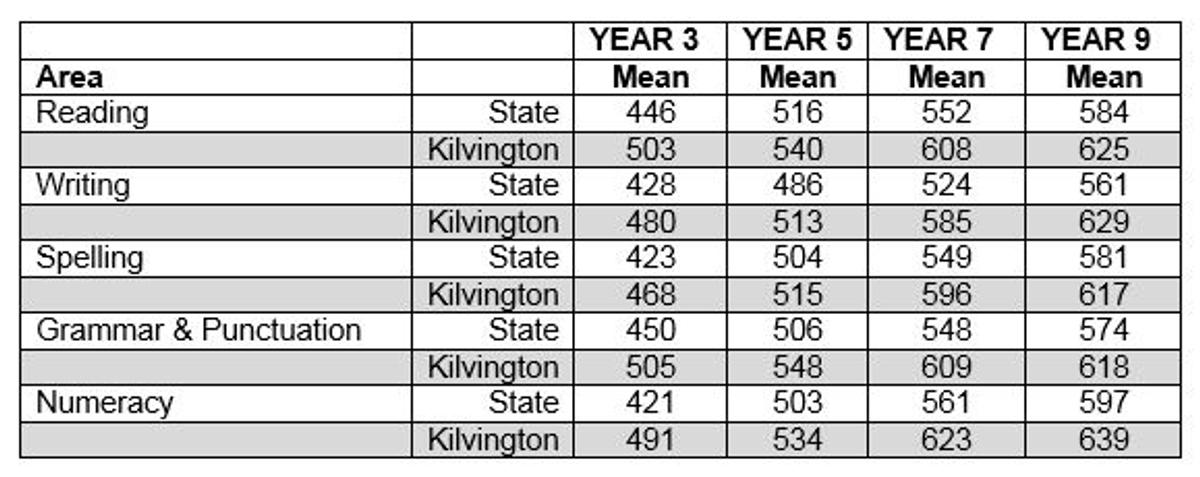From the Leadership Team
Leila Road Frontage

From the Leadership Team
Leila Road Frontage


Sebastian Earle, Head of Junior School
This week, students in Years 3, 5, 7 and 9 will have received this year’s NAPLAN results. It is also the 10 year anniversary since the tests were first implemented in 2008. So after a decade of robust conversation across the educational landscape it is timely to reflect on NAPLAN’s relevance to 21st century schools such as Kilvington.
Each year the controversial NAPLAN program remains a topic of vigorous debate with many key stakeholders arguing that it provides little use in guiding or improving national standards of education. To some extent this assertion is accurate as there remains significant limitations for the uses of NAPLAN data. Like similar standardised tests, NAPLAN shows a mere glimpse of a student’s understanding, skills and knowledge. If interpreted in isolation, the results provide little insight into student progress, not to mention their potential.
Unfortunately, it does not measure the many other areas of student growth that we at Kilvington see as integral in achieving long term success and positive wellbeing such as perseverance and resilience. Therefore, the results in isolation have not, and should never be, the source for major concern for individual students and families and certainly not be used to leverage an expected outcome. Teachers and parents should also be reminded of the delicate nature of student’s self-perception when interpreting and discussing their NAPLAN results openly. Labels, negative or positive, can have a harmful and long lasting impact upon student’s confidence and motivation.
Whilst acknowledging that the NAPLAN program is a divisive topic with clear limitations there does remain several key benefits for schools such as Kilvington. When used in collaboration with a variety of assessment data, such as those seen on the Parent Portal, NAPLAN can provide the evidence needed for developing school improvement across year levels and subjects. Furthermore, teachers can also moderate and compare the results to determine the best approach for supporting individual students. Needless to say, some students flourish under test conditions whilst many respond better to a more collaborative approach.
NAPLAN is certainly not a perfect model, nor does it claim to be, however, occasionally it may provide the missing piece of the assessment puzzle required to achieve better outcomes across the student body. Put simply, schools such as Kilvington have a responsibility to continuously analyse, interpret and question this data to determine strategic action plans to improve student outcomes.
We would like to extend a warm congratulations to all students who participated in this year’s NAPLAN and thank them for providing the School with a platform to continuously reflect and improve its practice.
Davina McClure, Deputy Principal
The following table reflects Kilvington’s summary report at Years 3, 5, 7 and 9 for each of the areas tested for NAPLAN 2017: Reading, Writing, Language Conventions – Spelling, Language Conventions – Grammar and Punctuation, and Numeracy.


This is an outstanding result for our School community, and one of which we can all be proud. We reiterate that while NAPLAN is an important measure, it is one of many and should be considered in the context of each student’s overall experience at school. Our priority is to provide our students with a holistic approach to education, focusing our efforts on supporting our students through academic excellence and care.
Congratulations to our outstanding teachers, our hardworking and committed students, and our supportive School community.
There has been a higher incident of influenza reported in Australia, and we are noticing an ongoing trend of students attending School who are unwell. We encourage parents to be vigilant. If your child is exhibiting any signs of illness please keep them at home for their own wellbeing and the other children at School.
Kilvington’s 2016 Annual Report is now available and can be viewed here.
Jon Charlton, Principal
Harold Dalton
Last week, on behalf of the Kilvington community, I attended the funeral of Harold Dalton who served the School as Treasurer from 1955 to 1987. Fittingly Dalton Hall was named after him in 1974.
Harold was a very humble man and a wonderfully committed volunteer and loyal supporter of our community. The Kilvington of today is built upon the selfless efforts of past members like Harold Dalton. We owe much to him.
Harold is survived by five children and 11 grandchildren.
John Allin
Past Kilvington Board member, John Allin, passed away on Saturday after a seven-week fight against a lung infection he picked up overseas.
John was a journalist and public relations practitioner, who worked at The Age for 25 years. He served on the Kilvington Board from 2004-2011. He took particular interest in the marketing of Kilvington, where his eloquence in word was a wonderful asset for the School.
John was ever the team man who guided discussions in a gentle, positive, cheerful and humorous way. He was a key supporter of the School’s transition to coeducation, which has proven to be an outstanding success.
John had time for all members of our community. He delighted in listening to and talking to people, taking a genuine interest in their lives.
John was the creative mind behind Kilvington’s sponsorship of the Melbourne Press Club, which has given our students the opportunity to attend and contribute to topical presentations delivered by dignitaries, politicians, academics and the media.
John is survived by his wife Dallas, daughters Jess and Jacqui, both Kilvington Alumni, and grand-daughters Layla and Maya, who gave him so much joy since they were born last year.
Out of respect for Harold and John, the School flags were lowered. Both will be generously remembered and sadly missed.